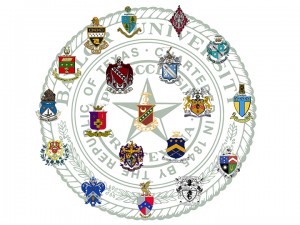Fraternities on campus are already in the midst of Rush for the 2013-2014 school year as the groups broadcast their Greek letters through t-shirts and fliers.
College sophomores and upperclassmen can participate in the Interfraternity Council’s (IFC) Rush process during the fall semester. Fraternity Rush lasts two weeks at the beginning of both the fall and the spring semesters.
Austin Hayes, coordinator of Greek life for fraternities, explained how IFC performs its Rush process.
“IFC and the local and independent fraternities recruit together,” Hayes said. “They have two weeks, usually, of formal recruitment events. Those formal events range. Individuals interested in certain chapters can attend.”
The two weeks of fraternity Rush began at Late Night at the SLC and will continue until Bid Day on Friday.
“The chapters put on individual events throughout those two weeks,” Hayes said. “It’s about building connections in different organizations, meeting different individuals, determining what different chapters stand for, and what different chapters are about.”
Woodinville, Wash., junior Gannon McCahill, vice president of IFC Recruitment, stated the importance of finding out how each fraternity is different.
“For a guy who doesn’t know much about fraternities, check out as many as you can,” McCahill said. “They’re all very different. They all have different ideals. You need to find out what’s important to you and what you’re looking to get out of a fraternity.”
Unlike Panhellenic recruitment, individuals participating in IFC Rush do not have to rush every group. Fraternity prospects are able to decide which fraternities they would like to pursue and attend those events.
“I like IFC recruitment because you can check out the different fraternities if you want to, but you don’t have to,” McCahill said. “Once you decide you don’t like a fraternity and it’s not for you, you don’t have to continue to keep going back to it.”
IFC hosts a few formal events for potential members, but most of the events are done through the individual chapters. Potential members can learn about the events by receiving handouts from the chapters or through social media.
When asked about hazing policies, both Hayes and McCahill answered that Baylor’s policy on hazing is simple: it isn’t tolerated.
“Ultimately, fraternities are about being a bond of brothers,” McCahill said. “If older members are hazing younger members, it doesn’t get the ideals across.”
In order to be eligible to rush a fraternity, the individual must have a GPA of at least 2.5 and 12 completed credit hours at Baylor.
Those who are eligible must have attended the mandatory meeting Effectively Developing Greeks (EDG) on Wednesday in order to receive a bid.
A bid is an invitation from a fraternity to an individual to join their organization.
McCahill said not every individual is guaranteed a bid.
“Fraternities aren’t for everybody,” he said. “Unfortunately, not everybody can receive a bid. It’s a little more competitive.”
Hayes said she encourages potential members to attend as many events as possible to get to know the men of the fraternities.
Hayes said recruitment is about meeting people.
“The more chapters you can get to know, the better,” she said.
IFC has nine fraternities that will host Rush this year, as well as local and independent fraternities on campus.
Hayes is available to answer any questions or concerns concerning Rush. For further questions regarding individual fraternities, contact the recruitment chairs from the respective chapters.







